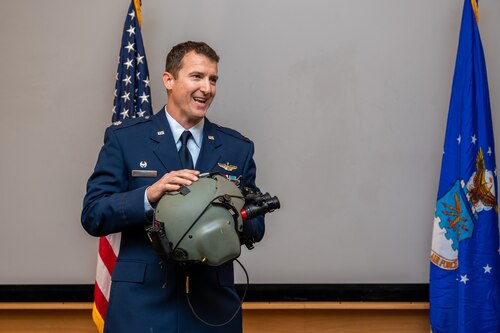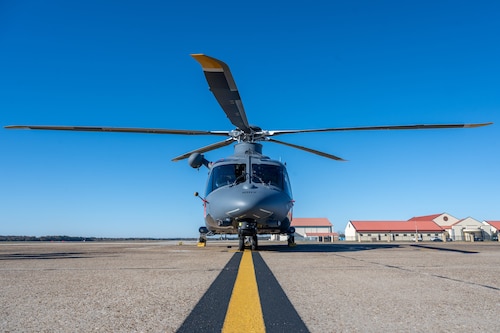Maxwell Air Force Base marked a historic moment Dec. 6, with the activation of the 24th Helicopter Squadron.
Presiding official for the activation ceremony and assumption of command, Col. Lane Cook, 58th Operations Group commander, took a few minutes to discuss the importance of the ceremony.
"I'm going to step back in time to set the stage for why today's ceremony is so important," Cook said. "Seventy-two years ago, the U.S. Army identified a need for a light utility helicopter, and in 1964, the Air Force followed suit. Now after 60 years of service we are taking the next step in the evolution of Air Force rotary wing operations."
The 24th HS's story began in December 1939 as the 24th Bombardment Squadron (Light), established at Maxwell Field. Over its decades-long history, the squadron evolved through roles as a reconnaissance unit, a tactical air support squadron, and a special operations squadron, contributing to missions in World War II's China-Burma-India Theater and beyond.
In 2020, the squadron was deactivated, but its heritage endured.
"The 24th has a deep and historic legacy, making it the perfect choice to lead this new chapter in rotary wing operations," Cook said. "I'm confident that no other base could match the historical significance and perfect operating environment for the 908th Flying Training Wing and the 24th HS to thrive and develop Grey Wolf crews well into the future."
Bringing the 24th's heritage full circle back to Maxwell AFB has generated a sense of pride and excitement among squadron members, and for new squadron commander, Lt. Col. Derek Cumbie, this history is a driving force.
"Taking on this new identity anchors us through the massive changes. Recently, we've gone from a fixed wing C-130 to a rotary wing MH-139, and from a tactical airlift mission to a flying training mission," he said. "We've also gone from solely Reserve only, where there was no association, to now having an active-duty associated partner, which is the 24th Helicopter Squadron. Our identity has changed to fit the demands of the mission, and the training mission is right around the corner."
In the next 18 months, the squadron will welcome its first cohort of students for the MH-139A Grey Wolf helicopter, where they will build on foundational skills learned in basic helicopter courses, refining them into mission-ready capabilities focuses on complex operational scenarios, including night landings, low-altitude maneuvers and precision targeting.
Operating a helicopter training unit is more than just flying helicopters Cumbie explained.
"I'm going to step away from the speaking podium and be a little bit of an instructor today," he said. "I see we have some young faces in the room, and maybe some people don't know what all is involved with a helicopter training unit. It's about flying a multi-million-dollar aircraft at 50 feet above treetops, landing in unlit fields on moonless nights, and ensuring that our team is ready to protect our nation's strategic assets."
The activation of the 24th HS signals not only a new chapter for Maxwell AFB but also a renewed commitment to the Air Force's mission. With its historic roots and future-focused training program, the squadron is poised to make a lasting impact on rotary wing operations.
"As we reflect on our heritage and take hold of our new identity and look to the future of our mission, I know you're ready," he said. "This mission is no small task, and it requires a team approach. We're here to train students and support the total force integration, but we're also here to lead. We have a unique opportunity to make our mark and influence this [formal training unit] and our MH-139 community for years to come. Let's use our influence and let's make this a success."








